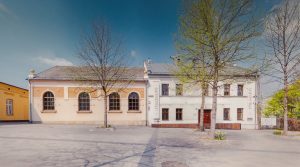As expected, antisemitic incidents reached a historic high in Canada in 2024, with 6,219 reported incidents including firebombing of synagogues, attacks on schools and Jewish-owned businesses, and several arrests of suspects on terror-related charges.
B’nai Brith Canada reported its findings at an Ottawa press conference on April 7, as the organization released its annual antisemitism audit.
“These 6,219 incidents represent a 7.4 percent increase from 2023 and an inexcusable 124 percent increase from 2022. Over the past 18 months, a previously unfathomable new baseline for the occurrence of antisemitic incidents in Canada has been established,” said B’nai Brith’s Richard Robertson.
“The atrocities of Oct. 7, 2023, opened deep fissures in Canadian society,” the director of research and advocacy said in a press release that accompanied the audit. “The subsequent rise in antisemitism has exposed a disturbing undercurrent of Jew-hatred driven by a virulent, radicalized minority.”
Incidents of harassment, which includes slurs, statements and systemic discrimination, rose by 58 percent since 2022, to a total of 5,818. (The amount based exclusively on online harassment rose to 5,367 incidents, an increase of 161 percent from 2022.)
While 15 incidents of violence and 386 cases of vandalism were also recorded, online harassment constituted the vast majority of all reported antisemitic incidents—totalling 86 percent.
Incidents increased in many regions, specifically in Quebec—which recorded 1,651 incidents, an increase of 215 percent over 2023—and Alberta with 916 incidents—an increase of 160 percent from the previous year.
Ontario saw the largest single number of incidents of any province, but the 1,782 reports represented a 25 percent decrease from 2023.
“The Jewish community has been subject to bigotry far greater than any other religious or ethnic minority, both on a per capita basis and in absolute numbers,” said B’nai Brith’s David Matas. “Antisemitism in Canada is becoming normalized.”
The ongoing war in Gaza, triggered by the Oct. 7 Hamas attack on southern Israel, was cited as the contributing factor in the alarming growth of antisemitic attacks.
But this war is just of 110 global armed conflicts currently occurring, Matas pointed out.
“None of these 110 others present the features we see with the Israel-Hamas conflict, a global spread of bigotry, directed against those who share ethnic or religious identity with one side of the conflict.”
The justice system needs to become more effective in prosecuting hate crimes, says Matas, who serves as senior legal counsel for B’nai Brith. While about 30 police forces across the country have hate crime units, similar dedicated resources don’t exist in the prosecution system.
Matas attended the national forum on combatting antisemitism held in Ottawa last month, and noted the problems of policing and prosecuting hate crimes was discussed.
“What I heard informally is that police will go to the prosecutors and the prosecutors say we don’t think we’re going to get a conviction, we’re not going to go ahead, so that stymies them. We need an integrated system, where not just the police are involved but the city government, and also the courts.”
Understanding hate crime is a “more sophisticated” problem than for example auto theft, said Matas: “When you’re dealing with hate speech you have to understand the discourse, and its impact and its meaning and lot of it is coded and indirect.”
Canadian society needs to be more aggressive in combatting antisemitism, added Robertson. “We need to ensure that our police forces are properly empowered, that there are adequate provisions with the Criminal Code for the police to utilize to combat some of the criminal activity we are seeing play out across Canada on our streets.”
Municipalities also “need to ensure that they are passing legislation that is adequately able to protect the Jewish population across Canada, and this includes things like vulnerable infrastructure legislation,” Robertson said.
Often referred to as ‘bubble zone’ legislation, laws which would establish protest-free buffers around schools, community centres and houses of worship have been discussed by a number of municipalities across Canada—and they have been enacted by several cities.







